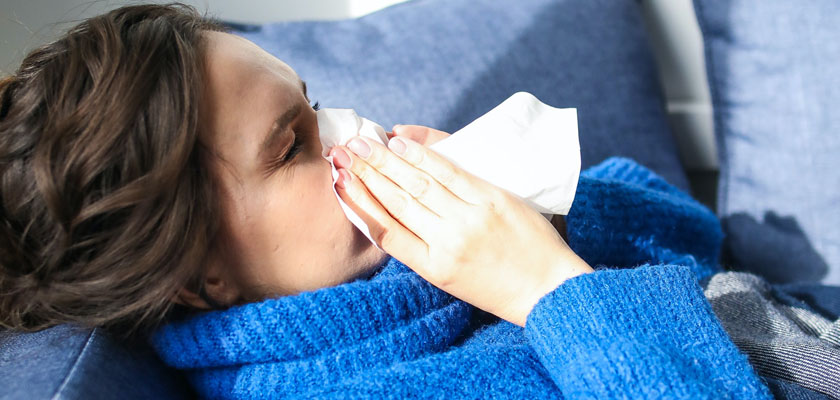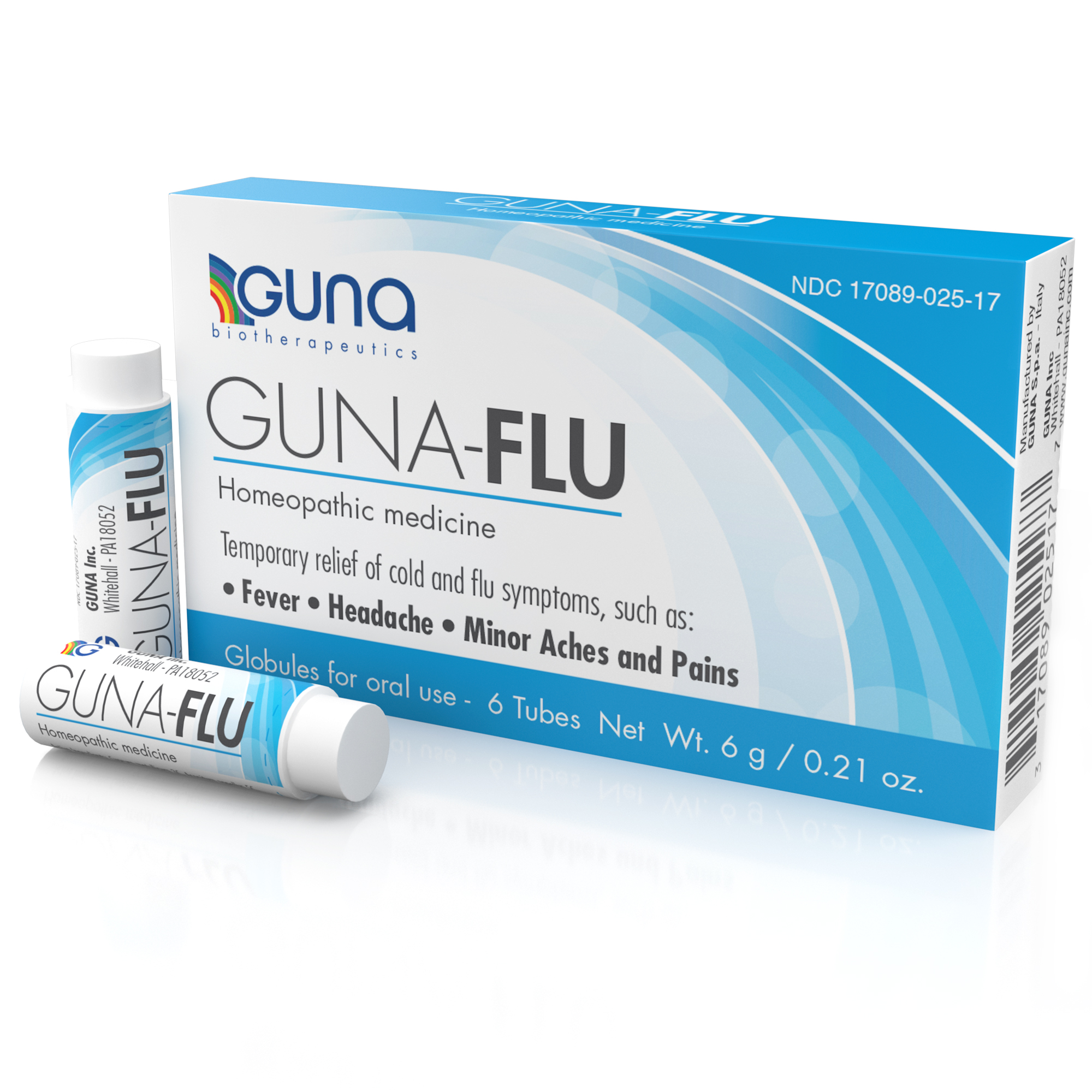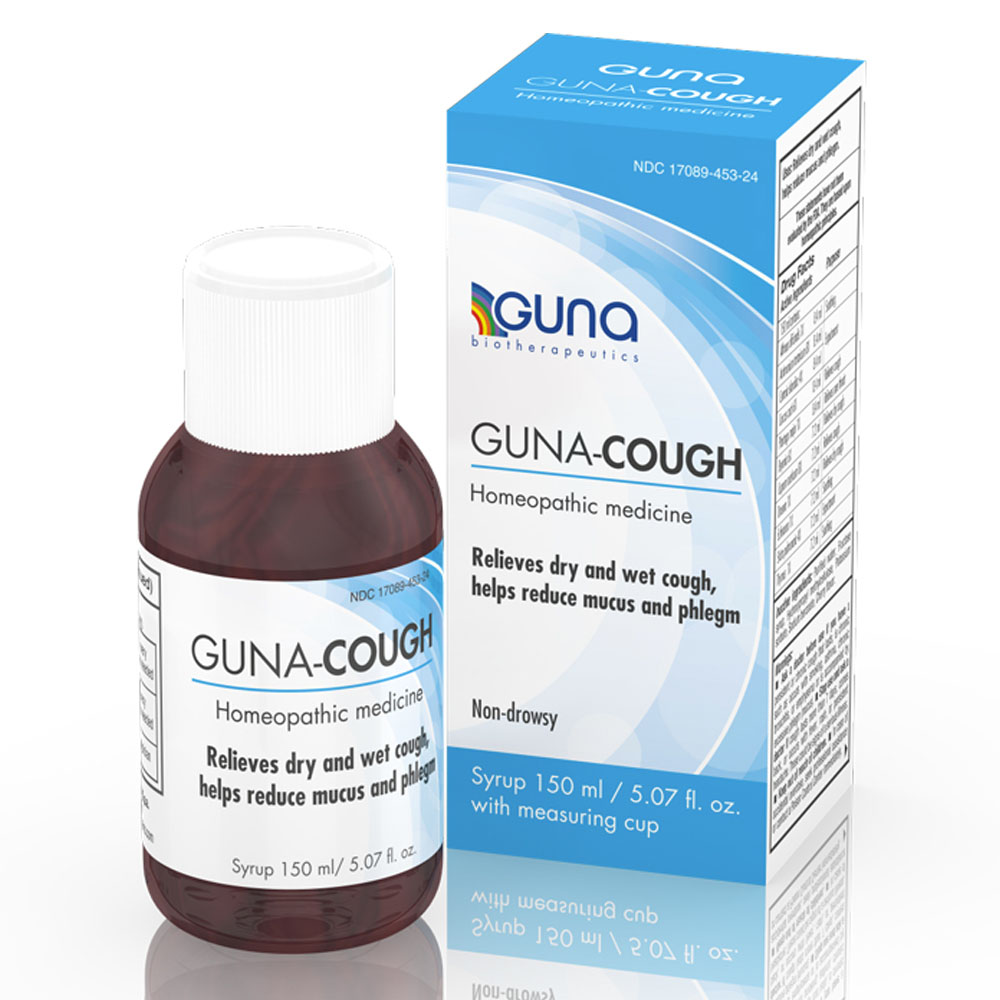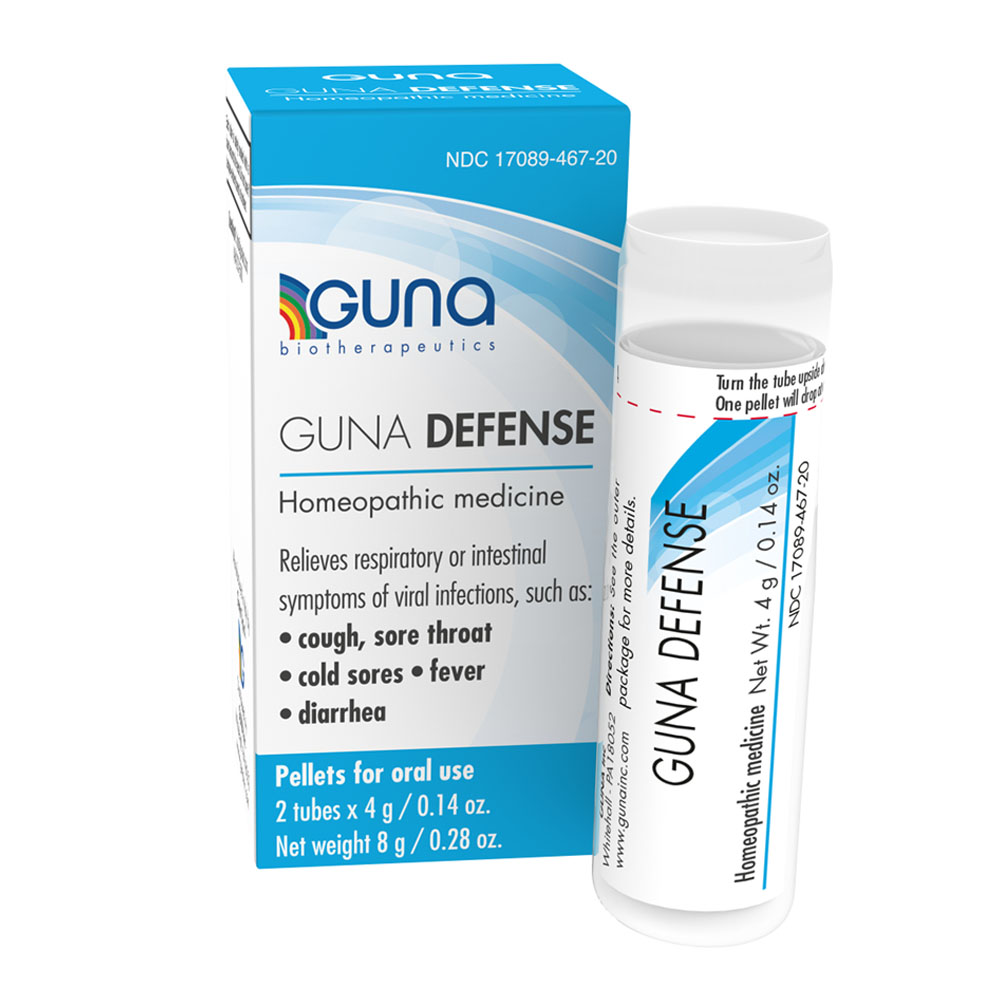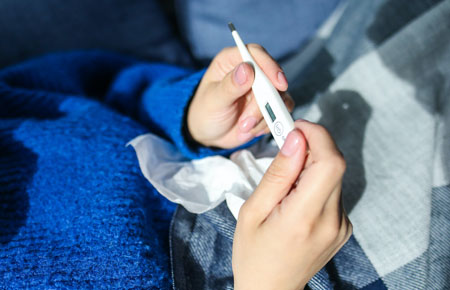Flu Season – Are you Prepared?
Seasonal transitions are often difficult. The constant temperature fluctuations and weather variations put our bodies to the test. It’s no coincidence that colds and sore throats are common in these conditions.
As with every year, we must fully prepare for flu season. Flu is an acute respiratory disease with an incubation period of 48 to 72 hours caused by viruses that attack the upper or lower respiratory tract. It is frequently accompanied by fever, headache, cough, joint and muscular pain, asthenia, and, in some cases, vomiting and diarrhea.
Flu and flu-like syndromes are estimated to impact 5-20% of the population in the United States. Children, the elderly, and immunocompromised patients are the most vulnerable.
Many of the flu syndromes are not really “influenza” syndromes but are flu-like syndromes. There are over 250 flu-like viruses capable of causing symptoms like those of flu without being the “real flu”. Even if you are vaccinated, unfortunately you will not become immune against these viruses.
How To Avoid A Sore Throat and Flu During Flu Season
To reduce the discomfort associated with a common sore throat you can use spray remedies that give a sense of freshness and relief.
A sore throat is one of the most annoying symptoms typical of early winter. You can be predisposed, but it is difficult to have never suffered from it even once in your life. A sore throat is often also one of the symptoms that precede or accompany the onset of the flu. However, the definition of a sore throat is not complete because there are several types of conditions.
Pharyngitis is an inflammation of the mucous membrane of the pharynx, the organ responsible for the passage of air and food. It can be triggered by irritating factors such as dry air, aggressive detergents, smoke, vapors and dust, alcohol abuse, but also by pathogens such as viruses and bacteria.
Tonsillitis, on the other hand, is an inflammation of the tonsils, small formations of lymphatic tissue which, thanks to a high presence of immune cells, create a true and proper protection of the upper airways. Tonsillitis is generally caused by pathogens (viruses in 40-70% of cases and bacteria).
If, on the other hand, the trachea is affected, it is called tracheitis, which is often associated with inflammation of other parts of the respiratory system, especially the larynx.
Since a sore throat often appears with the flu syndrome or in conjunction with a very strong common cold, important help can come from trying to strengthen one’s immune system to counter the invasion of viruses and bacteria.
9 Useful Tips

In any case, whether it is a ‘simple’ sore throat or an easy route through which the flu could affect your body, here are some tips we can follow to try to avoid both cases, without forgetting to consult one’s own doctor for advice on your specific situation:
- Protect your hands and feet from the cold. Hands and feet are often the first victims of the cold climate typical of winter. It is therefore important to rely on warm and enveloping socks and gloves to cover our extremities.
- Dress for the weather. Wearing a sweater or jacket (preferably made of cotton), in fact, allows you to create a space of uniform and constant warmth between the skin and the environment, a sort of armor to protect the body from sudden temperature changes.
- Avoid overusing the heating system: Whether it be at home, the office, or in the car, the heating system must be used sensibly and gradually to avoid suffering rapid temperature swings. We cannot control the temperature on public transportation, but we can always drop a few layers because we have likely chosen layered clothing.
- Wash your hands often and carefully: It is important to remember to wash your hands often during the day and do it thoroughly. It is not enough to rinse with water, you need to lather your hands well for about a minute.
- Avoid stress: This is always good advice! Maintaining a Zen approach to life and its daily tasks helps our immune system to remain efficient.
- Inhaling vapors of hot water and baking soda or essential oils: The steam helps to clear the nose, promoting dissolving of phlegm, and helps the well-being of the throat. This works especially well if other ingredients such as baking soda are combined with boiling water, it has disinfectant properties, or essential oils with calming properties such as eucalyptus which is useful for coughs or lavender with anti-inflammatory properties.
Avoid smoke, alcohol, dust, dry or poorly ventilated environments, and high temperatures: to avoid a sore throat or to get rid of this annoying ailment faster, it is better to avoid all these irritating factors.
- Consume more garlic, orange, and kiwi juices. Garlic is a real natural antibiotic, known for some time for these properties. Oranges and kiwis, on the other hand, contain high amounts of vitamin C, an important substance needed during this time of the year.
- Cover the mouth and nose when coughing/sneezing: A sneeze travels at an average speed of 160 km/h. It is important to cover your nose and mouth with a tissue to then be discarded immediately into a trashcan. Otherwise, coughing or sneezing into the crease of your elbow can be a more hygienic alternative than covering your mouth with your hands. If you use your hands, it is important to remember to wash them immediately with soap and water.
How To Reduce Flu Symptoms – Specifically Fever
How to reduce fever symptoms in children and adults during the flu season without drugs, in a few hours: sweating, drinking water, and other helpful tips.
- How to regulate the onset of fever
- Fever in adults, when to worry
- Fever without any other symptoms
- How to regulate fever without medications
- How to reduce fever in children
- Reduce fever with simple precautions
- What to do when you sweat with a fever
- Do vinegar and alcohol reduce fever?
- How to reduce fever symptoms at home
- Can I take a cold shower in the winter?
Fever is a reaction of the human organism to protect itself from viruses or bacteria.
It occurs with a temporary rise in body temperature (which normally ranges between 97 F and 99 F, depending person to person, time of day, on age and other conditions) and sometimes with other symptoms such as: headache, diarrhea, sore throat, cough, etc.
Unless it exceeds 103 F, fever is almost never a cause for concern in adults, as it means that the immune system is activating its resources: preventing pathogens from proliferating, creating an environment that is not conducive to their development and accelerating the metabolic processes of the organism (heat increases the speed of biochemical reactions) in order to eliminate them more quickly.
Fever is one of the most effective defense mechanisms against infections: it is a precious ally, not an enemy! It is not reasonable to bring it down abruptly, as this slows down healing.
This matter is different for children, especially for newborns, who must be treated with greater attention due to the immaturity of their immune system and a greater possibility of the onset of some complications induced by an uncontrolled fever. In this case, contact your pediatrician.
Fever In Adults, When To Worry
Although it is a common and benignant reaction, fever very often generates fear, especially when it is high.
Let’s not forget that it is not a disease, but a symptom that accompanies a disease.
It can be more debilitating above 103 F in adults; in this case the physical discomfort is greater, and the fear of further worsening can alarm more than necessary and give the feeling of “not overcoming it”, of being more seriously ill and of needing immediate treatment to resolve this episode as soon as possible.
Taking antipyretics and other specific medicines is not necessarily the first thing to do, especially if there are no other symptoms of malaise.
Fever is our precious ally: at 100 F, the spread of a virus is curbed by 90% and, in most cases, a further temperature increase can stop that spread completely.
If high fever persists for two to three days, then a thorough investigation should be done, such as a chest X-ray, pharyngeal swab, other tests, or what the doctor will suggest after a careful medical examination.
Do-it-yourself is not a good way to care for yourself in this situation. It is essential to understand the causes of fever and for this reason it is necessary to consult your doctor.
The causes of prolonged high fever can be different:
- Respiratory tract, bladder, or other infections
- Post-surgical reactions
- Effect caused by prolonged and improper intake of drugs
- Reaction to some drugs such as antibiotics, anti-hypertensives, and anticonvulsants
- Chronic inflammatory diseases (e.g., rheumatoid arthritis and vasculitis)
- Reaction to a vaccine
- Heatstroke
- Degenerative disease
Usually, once the cause has been identified, it is possible to act directly on it, based on the doctor’s diagnosis and the treatment prescribed. In this way the fever will drop gradually and spontaneously, without taking drugs that suppress it artificially.
As for young children, however, special attention must be paid when the person concerned is elderly and even more if affected by heart, lung, kidney, or degenerative diseases of different kinds.
Fever Without Symptoms
The origins of fever can be various and induce the development of one symptom rather than another. If you have an infection in the auditory system, for example, you experience earache. You could have fever without a sore throat in the absence of infections or inflammations of the oropharyngeal tract.
Fever may occur even without symptoms, as in the case of heatstroke or temporary cold, due to a sharp change in environmental temperature and to our failure to adapt.
Especially in the summer, due to uncontrolled sun exposure and temperature changes, mainly due to air conditioning in closed places, body temperature can rise without necessarily being accompanied by other symptoms.
However, should a high fever last for several days, you’d better contact your doctor and do diagnostic tests to find out the cause.
The causes are mostly bacterial or viral infections.
How To Reduce Fever Symptoms Without Taking Drugs
If the fever is caused by a simple cold or a common viral infection, the use of drugs may not be necessary.
Within a day or two it will disappear if observing simple precautions:
- Stay at rest and well covered
- Protect from temperature changes
- Drink lots of liquids (mainly water, but fruit juices are also fine in the absence of dysentery)
- Take a lukewarm (not cold) bath, be sure to dry well, in a comfortable environment and avoiding the cold or making physical effort
- Apply wipes moistened with lukewarm water to the forehead and wrists for temporary relief
- Applying a hot water bottle to the inflamed area can provide relief in cases of respiratory or gastrointestinal symptoms
- Doing an enema with warm water (98F, normal body temperature) can reduce the fever
- Eat what you need without overloading your body. Usually appetite decreases due to fever; eating reluctantly is not healthy. A little fasting or the consumption of light meals (vegetable broth, boiled rice) can be useful and restore the right energy
In pharmacies there are low-dose medicines that can support the immune system without blocking the inflammatory and feverish response of our body to protect itself against pathogens, as we have said above.
How To Regulate Fever From The Very Start
In some circumstances, you cannot “afford” to have a fever, because our busy everyday life requires us to be active and present!
Due to working needs, family, or any other important engagement, when fever rises, a thousand solutions are always sought to stop it from the very start, with the hope of being able to drop it within one day and recover in a few hours.
If, as we have seen, fever is a defense mechanism of the body to fight pathogens, however, trying to suddenly drop it and stop its normal course, would mean letting viruses and bacteria act in a habitat more favorable to them.
Obviously, this does not mean that a fever should never be addressed: you must pay attention to all the symptoms and contact your doctor.
Therefore, the advice of the experts to feel better in a short time is:
- Rest and relax
- Take a lukewarm bath
- Drink plenty of water and eat foods that contain vitamins (raw fruits and vegetables)
- Avoid sudden changes in temperature
- Cover yourself with appropriate clothing (dressing or undressing layered clothing and staying in a comfortable environment)
Ice packs are one of the remedies with an immediate effect, but they only drop the temperature for a short time and therefore do not have a healing effect (they do not act on its causes). In some circumstances they can even be counterproductive because they induce a sudden drop in temperature. You’d better follow the natural course and use the above-described tricks, more appropriate and gentler, rather than causing sudden changes in temperature, often ineffective, and even slowing down healing. Of course, people are tempted by the apparent (but deceitful) expectation of the benefit of “fresh relief”, but the price for this wrong behavior is decidedly disadvantageous for the course of the illness.
How To Reduce Fever Symptoms At Home During Flu Season
Unless there are serious health problems or alarming symptoms, fever should always be addressed at home. How to?
Just put all the above tips into practice and avoid unconventional methods such as ice, cold water, alcohol, and vinegar.
Sponging or Bathing With Vinegar
Among the most common natural remedies for dropping the temperature, the vinegar bath (especially the cider vinegar) is traditionally very popular.
You can find relief by pouring a few drops into the warm water of your bath.
This practice is an empirical and actually useless legacy of our ancestors.
The bath or lukewarm sponging described above are certainly more effective.
Alcohol Sponging
Alcohol is not recommended for sponging, since it causes vasodilation and disperses the heat that the body needs.
Moreover, despite its disinfectant properties, alcohol could also irritate the skin.
Being a Nervous System depressant, alcohol slows down the speed of processing sensory information and nerve transmission, so reflexes and healing will be slowed down.
Lukewarm Shower
A lukewarm shower (neither hot nor cold) is a cure-all.
Even those who have a fever can benefit from it, since the body disperses heat and reaches an optimum temperature in a short time.
Be careful, however, of the ambient temperature; it is absolutely necessary to avoid the cold immediately afterwards, since a sudden temperature change could increase the fever, instead of helping to resolve it.
If you are debilitated and do not feel able to stand, you can take a bath as an alternative, with the same precautions and taking care to dry yourself well and cover yourself immediately afterwards.
In the past, a cold bath or shower were often recommended to drop the fever, even in winter, but their temporary efficacy stimulated the body’s reaction of raising the temperature even more. It is not a good thing; therefore, it should be avoided.
What To Do When You Sweat With A Fever
When the body temperature rises, sweating increases and the body loses fluids faster.
When you have a fever, it is important to replenish lost fluids as much as possible and prevent dehydration by drinking lots of water, drinks with mineral salts, fruit juices, vegetable broth, herbal teas, or infusions (better to avoid stimulants like tea and coffee).
To avoid sweating excessively during a fever, it is advisable not to cover yourself with clothes and blankets that are too warm, but to satisfy our body’s temporary needs, and avoid extreme conditions.
How To Drop Fever In Children

If a child has a high fever, it is not necessary to be alarmed because, as we have already seen, it is an efficient defense mechanism of the body (the matter is different for newborns, who must be immediately monitored by expert staff in cases of high fever), which will require adequate intervention only if it persists over 48-72 hours.
To make our children feel better when they have a fever, you can therefore:
- Make them drink abundantly during the day (1-2 liters of water and other drinks, depending on body weight)
- Recommend rest, without forcing them to stay in bed if they do not request it
- Use suitable clothing to facilitate the regulation of their temperature and air the rooms when the children are elsewhere (to prevent them from getting cold)
- Adequately adjust the temperature of the environment in which they are staying
- Do not force them to eat if they do not request it and have them eat easily digestible and assimilable foods (not sweets)
- Give them a short relaxing bath with water at a suitable temperature
- Give them an enema with 25 cc of warm water
- Look after them with love and patience, entertaining and distracting them with games and stories
GUNA’S Health Paradigm for Influenza
One of our goals during flu season is to assist everyone in search of their ideal state of well-being.
One of our goals and our health paradigm is to motivate everyone to search for their own ideal well-being, without managing only symptoms, but aiming to keep the organism in a state of physical, mental, and emotional balance. Which is a privileged condition to activate one’s immune system to be at its best. It is the concept of a Medicine that interprets the Human Being as a fusion of body, emotions, mind, and spirit – scientifically represented by PNEI (Psycho-Neuro-Endocrine-Immunology) – whose imbalances interact with each other. Doctor and patient should aim to achieve and maintain a dynamic balance between those aspects. Consequently, our medicines are designed to stimulate the body to restore its harmony and not to suppress the symptoms that are useful indicators of its malfunctioning.
We believe that this interpretation of the human being in a holistic sense finds its natural therapeutic application in our cutting-edge products. Reducing the symptoms of the flu is no exception: together with vaccination, recommended for the most at-risk categories, which protects against the flu virus, today new remedies are available that can improve the immune response also against the numerous parainfluenza viruses as well as when we need to face mutated viruses. Scientific studies show that the special association of some substances used in homeopathy protects the body in a natural, safe, and harmonious way.

